13 start with M start with M
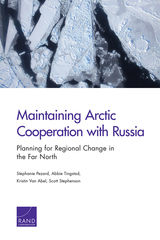
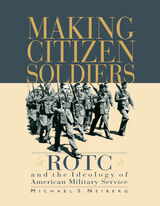
This book examines the Reserve Officers Training Corps program as a distinctively American expression of the social, cultural, and political meanings of military service. Since 1950, ROTC has produced nearly two out of three American active duty officers, yet there has been no comprehensive scholarly look at civilian officer education programs in nearly forty years.
While most modern military systems educate and train junior officers at insular academies like West Point, only the United States has relied heavily on the active cooperation of its civilian colleges. Michael Neiberg argues that the creation of officer education programs on civilian campuses emanates from a traditional American belief (which he traces to the colonial period) in the active participation of civilians in military affairs. Although this ideology changed shape through the twentieth century, it never disappeared. During the Cold War military buildup, ROTC came to fill two roles: it provided the military with large numbers of well-educated officers, and it provided the nation with a military comprised of citizen-soldiers. Even during the Vietnam era, officers, university administrators, and most students understood ROTC's dual role. The Vietnam War thus led to reform, not abandonment, of ROTC.
Mining diverse sources, including military and university archives, Making Citizen-Soldiers provides an in-depth look at an important, but often overlooked, connection between the civilian and military spheres.
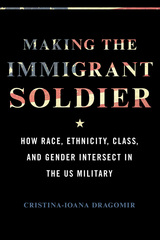
A compelling union of analysis and rich storytelling, Making the Immigrant Soldier traces the complexities of serving in the military in order to pursue the American dream.
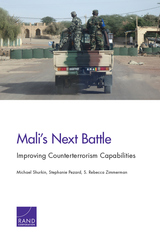
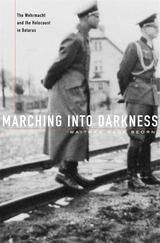
On October 10, 1941, the entire Jewish population of the Belarusian village of Krucha was rounded up and shot. While Nazi death squads routinely carried out mass executions on the Eastern Front, this particular atrocity was not the work of the SS but was committed by a regular German army unit acting on its own initiative. Marching into Darkness is a bone-chilling exposé of the ordinary footsoldiers who participated in the Final Solution on a daily basis.
Although scholars have exploded the myth that the Wehrmacht played no significant part in the Holocaust, a concrete picture of its involvement at the local level has been lacking. Among the crimes Waitman Wade Beorn unearths are forced labor, sexual violence, and graverobbing, though a few soldiers refused to participate and even helped Jews. By meticulously reconstructing the German army's activities in Belarus in 1941, Marching into Darkness reveals in stark detail how the army willingly fulfilled its role as an agent of murder on a massive scale. Early efforts at improvised extermination progressively became much more methodical, with some army units going so far as to organize "Jew hunts." Beorn also demonstrates how the Wehrmacht used the pretense of anti-partisan warfare as a subterfuge by reporting murdered Jews as partisans.
Through archival research into military and legal records, survivor testimonies, and eyewitness interviews, Beorn paints a searing portrait of a professional army's descent into ever more intimate participation in genocide.


With the resignation of General Renee Emilio Ponce in March 1993, the Salvadorian army’s sixty-year domination of El Salvador came to an end. The country’s January 1992 peace accords stripped the military of the power it once enjoyed, placing many areas under civilian rule. Establishing civilian control during the transition to democracy was no easy task, especially for a country that had never experienced even a brief period of democracy in its history.
Phillip J. Williams and Knut Walter argue that prolonged military rule produced powerful obstacles that limited the possibilities for demilitarization in the wake of the peace accords. The failure of the accords to address several key aspects of the military’s political power had important implications for the democratic transition and for future civil-military relations.
Drawing on an impressive array of primary source materials and interviews, this book will be valuable to students, scholars, and policy makers concerned with civil-military relations, democratic transitions, and the peace process in Central America.

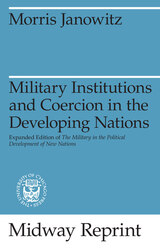

Among the various human interventions in landscape, war has left one of the most lasting and eloquent records, literally inscribed on the face of the earth. Military landscapes can assume different forms and functions; yet, by controlling vision and movement, they impose shared strategies of seeing upon geography and the environment.
Built around such fundamental concepts as representation, scale, nature, gender, and memory, Military Landscapes seeks to reevaluate the role of militarization as a fundamental factor in human interaction with land. Moving beyond discussions of infrastructure, battlefields, and memorials, it foregrounds the representational role of military landscapes across different historical periods, geographical regions, and territorial scales, covering a wide range of subjects, including the home front and refugee camps. It contributes to scholarship by shifting the focus to often overlooked factors, such as local knowledge, traditional technology, and physical labor, highlighting the historical character of militarized environments as inherently gendered and racialized. By juxtaposing and synthesizing diverse disciplinary perspectives, this volume seeks to develop a more inclusive and nuanced definition of military landscapes under the framework of landscape theory, based on their understanding as a physical reality as well as a cultural construction.

Drawing on declassified archival material in the United States and the United Kingdom, the author considers Khrushchev’s reversal of Stalinist expansionism by examining the motivation, function, and operation of the initial occupation of Romania; the complex involvement of Soviet diplomacy and its perception by the United States and other Western powers; the process by which Khrushchev decided to withdraw Soviet troops from that country; and the impact of this decision on Soviet policy. Verona extends his analysis, providing comparisons between Khrushchev’s and Gorbachev’s approaches to Eastern Europe, noting that similarities exist not only in domestic policies but in the realm of foreign policy as well.
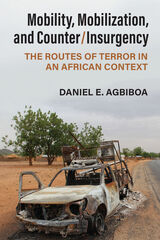
In Mobility, Mobilization, and Counter/Insurgency, Daniel Agbiboa takes African insurgencies back to their routes by providing a transdisciplinary perspective on the centrality of mobility to the strategies of insurgents, state security forces, and civilian populations caught in conflict. Drawing on one of the world’s deadliest insurgencies, the Boko Haram insurgency in northeast Nigeria and the Lake Chad region, this well-crafted and richly nuanced intervention offers fresh insights into how violent extremist organizations exploit forms of local immobility and border porosity to mobilize new recruits, how the state’s “war on terror” mobilizes against so-called subversive mobilities, and how civilian populations in transit are treated as could-be terrorists and subjected to extortion and state-sanctioned violence en route. The multiple and intersecting flows analyzed here upend Eurocentric representations of movement in Africa as one-sided, anarchic, and dangerous. Instead, this book underscores the contradictions of mobility in conflict zones as simultaneously a resource and a burden. Intellectually rigorous yet clear, engaging, and accessible, Mobility, Mobilization, and Counter/Insurgency is a seminal contribution that lays bare the neglected linkages between conflict and mobility.

READERS
Browse our collection.
PUBLISHERS
See BiblioVault's publisher services.
STUDENT SERVICES
Files for college accessibility offices.
UChicago Accessibility Resources
home | accessibility | search | about | contact us
BiblioVault ® 2001 - 2024
The University of Chicago Press









